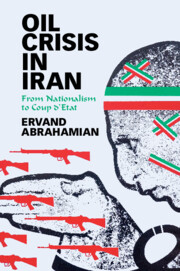
- Cited by 5
-
Cited byCrossref Citations
This Book has been cited by the following publications. This list is generated based on data provided by Crossref.
Shariatinia, Mohsen and Kermani, Hamed A. 2023. Iran, China and the Persian Gulf: An unfolding engagement. Global Policy, Vol. 14, Issue. S1, p. 36.
PASHAYİ, Mohammad Reza and KODAMAN, Timuçin 2023. The Transition from Nationalism to Islamism in Iran’s Foreign Policy. Aurum Journal of Social Sciences, Vol. 8, Issue. 2, p. 229.
Movahedi-Lankarani, Ciruce 2024. Precarious Petroleum. Comparative Studies of South Asia, Africa and the Middle East, Vol. 44, Issue. 1, p. 3.
Moghadam, Valentine M. 2024. The gendered politics of Iran-U.S. relations: sanctions, the JCPOA and women’s security. Third World Quarterly, Vol. 45, Issue. 7, p. 1199.
Ranjbar, A. Marie 2024. Iran as Subaltern Empire: Lake Orumiyeh, Environmental Injustice, and Coloniality in Iranian Azerbaijan. Antipode,
- Publisher:
- Cambridge University Press
- Online publication date:
- June 2021
- Print publication year:
- 2021
- Online ISBN:
- 9781108946278


